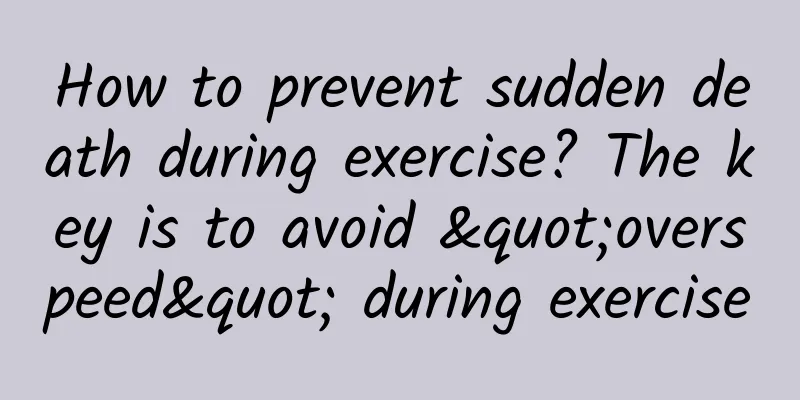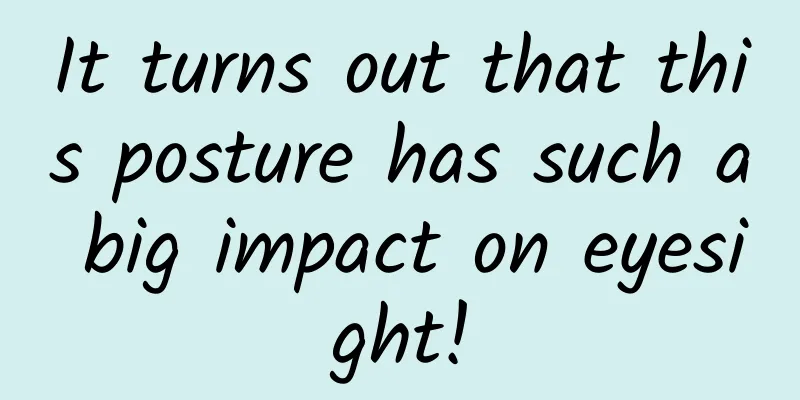How to prevent sudden death during exercise? The key is to avoid "overspeed" during exercise

|
Recently, 17-year-old Chinese badminton player Zhang Zhijie suddenly fainted during a game and died after being sent to the hospital but failed rescue efforts. The issue of sudden death during exercise has attracted attention from the entire network. Who are the high-risk groups for sudden death during exercise? How can we better prevent accidents? How can we better protect our teammates when encountering similar situations during sports? On July 4, the reporter interviewed multidisciplinary experts from Henan Provincial People's Hospital. Vigorous exercise in a high temperature environment can easily induce sudden death Life lies in exercise! However, exercise is not something you can do as you please. Zhao Guihua, deputy director and chief physician of the Department of Cardiopulmonary Function at Henan Provincial People's Hospital, said that improper exercise can not only cause injuries, but more frighteningly, it can lead to sudden death during exercise. According to relevant information from the World Health Organization, non-traumatic accidental death that occurs during exercise or within 24 hours after exercise is called sudden death during exercise. Exercise-induced sudden death is mainly related to heart and cerebrovascular diseases. Other causes such as heat stroke and drug abuse can also cause sudden death. Vigorous exercise, especially in a hot environment, can induce heat stroke and even cause death. Moreover, sudden death during exercise occurs not only in professional athletes, but also in ordinary fitness enthusiasts. According to a survey conducted by the Institute of Sports Science of the State Sports General Administration, the sport with the highest incidence of sudden death during exercise is running, accounting for 33.98%, followed by football and basketball. "Office workers who are used to running at night should pay special attention to the amount of exercise." Zhao Guihua said that due to heavy work during the day, high-intensity exercise at night will not relax the body. Instead, it will increase the cardiopulmonary load and increase the risk of sudden death. Understand your body's limits and don't overload your heart rate during exercise For people who love sports, how can they correctly grasp the amount of exercise that is suitable for them? Zhao Guihua said: "First of all, we should avoid excessive exercise load. Under normal circumstances, heart rate can be used to measure exercise load: 220 minus age is the maximum heart rate that one can withstand." At the same time, she suggested that relevant people go to the hospital for a cardiopulmonary exercise test to understand their physical exercise limits. Through a comprehensive and systematic examination, the doctor will prescribe a detailed "exercise prescription" to help everyone develop an exercise plan that suits them and avoid exercise risks as much as possible. Zhao Guihua introduced that the cardiopulmonary exercise test is a non-invasive test method that objectively evaluates the cardiopulmonary reserve function and exercise endurance. It continuously and dynamically monitors and analyzes the patient's gas metabolism, electrocardiogram, blood pressure, blood oxygen saturation and other data from rest to exercise to the maximum limit state and recovery period to quantitatively evaluate the subject's cardiopulmonary function status, allowing the subject to clearly understand his or her own exercise limit. "The cardiopulmonary function department has seen many 'sports enthusiasts' who experienced chest tightness, palpitations, fatigue, etc. during exercise, but no abnormalities were found in electrocardiograms and pulmonary function tests." Zhao Guihua said that it was the cardiopulmonary exercise test that ultimately helped them discover hidden diseases such as thrombosis and arrhythmia. Doctors will prescribe detailed exercise prescriptions based on their conditions and "customize" suitable exercise methods to reduce exercise risks. Be alert to the "signals" given by your body In recent years, there have been frequent news reports of sudden deaths during exercise. Some people collapsed on the football field, some fainted next to gym equipment... Many of them were young people, which is a pity. Zhao Guihua said that the body may have sent out signals before a heart accident, and everyone needs to be vigilant in daily life. For example, if you experience chest pain, chest tightness, or chest discomfort after exerting yourself in exercise or activity; shortness of breath or a feeling of suffocation, which may be accompanied by sweating, dizziness, or nausea; or unexplained fatigue or weakness, or chest tightness or edema, you should be alert to the occurrence of sudden death, which may be caused by myocarditis or cardiomyopathy. In addition, if you have an organic heart murmur during a physical examination, or if you have a family history of hereditary heart disease or sudden death, you should be alert. If you experience chest discomfort or abdominal discomfort after exercise, after meals, or at night and if these symptoms do not subside, you should go to the hospital promptly for an electrocardiogram and myocardial enzyme spectrum tests to rule out some acute cardiovascular events. It is worth mentioning that not all heart accidents are "heartache". Some patients will feel toothache, stomachache or shoulder pain before sudden death. This may be pain caused by myocardial ischemia and should not be ignored easily. Some heart accidents that happen to young people may also occur after fatigue or viral infection. "Some people think that their colds have healed, but in fact, it may turn into viral myocarditis. At this time, if you want to exercise and sweat, or keep working at a high intensity, it is actually a more dangerous time. It is recommended not to force yourself, as accidents are likely to occur." Zhao Guihua reminded. When a teammate suddenly falls down, the "golden 4 minutes" to rescue him is crucial Sudden death during exercise is often urgent and dangerous, with a high mortality rate. The speed of treatment determines the patient's life or death. Not long ago, Dong Shujuan, director of the Department of Cardiology at the North Campus of Henan Provincial People's Hospital, and her team also encountered a case of sudden death during exercise. It was a 30-year-old basketball enthusiast in Zhengzhou. He suddenly fainted and his limbs twitched while playing basketball with his teammates in the morning. Fortunately, a teammate happened to have CPR skills and immediately rushed forward to continue CPR for him. Just a few minutes later, emergency personnel arrived at the scene and transferred the patient to the hospital. Dong Shujuan and her team implanted a subcutaneous defibrillator S-ICD for the patient, and the patient recovered smoothly and returned to normal life. "The patient suffered from exercise-induced idiopathic ventricular fibrillation. Without the CPR by his teammates, there would be no chance of rescue." Dong Shujuan said that the whole society should popularize CPR first aid knowledge. The four minutes after sudden death is the golden time for rescue. If someone suddenly faints during exercise, CPR should be performed immediately, and others should be called to call for emergency help. After successful rescue of patients with sudden death during exercise, an implantable cardioverter defibrillator (ICD) can be implanted for secondary prevention. |
<<: What should you do if you encounter an epileptic seizure? Experts recommend this
Recommend
Girls have pain on one side of their vulva when pressing
If a girl's vulva hurts on one side when pres...
Causes of bleeding during sexual intercourse after menstruation
During menstruation, women experience bleeding fr...
Why does my lower abdomen feel sore after an abortion?
Everyone knows that abortion is extremely harmful...
How to maintain after hysterectomy?
The uterus plays a role in the female body that c...
When should pregnant women start taking DHA?
Pregnant women need to supplement a variety of nu...
Tips for turning over with 3D color Doppler ultrasound
When the pregnancy is around six months, you shou...
What's the best thing to eat when my aunt comes?
Many people know that women’s menstrual period ca...
Results of self-assessment of postpartum depression
The symptoms of postpartum depression are somewha...
What are breast nodules?
Due to shyness, young women rarely go to the hosp...
Bitter mouth during pregnancy to verify gender
Every baby is born with the great expectation and...
Why can we eat tripe after just blanching it?
Tripe is rich in nutrients such as protein, fat, ...
How to sleep when you have your period
Menstruation is the menstrual phenomenon of women...
Are you measuring your blood pressure correctly?
1. Electronic sphygmomanometer or mercury sphygmo...
Can I have a massage during my period?
We should all be familiar with menstruation in ou...









